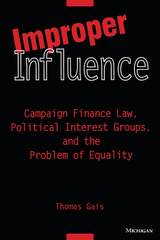
What donors, especially business donors, expect for their money is "access" and access means a lot more than a chance to meet and talk. They count on secret behind-the-scenes deals, like a tax provision that applies only to a "corporation incorporated on June 13, 1917, which has its principal place of business in Bartlesville, Oklahoma." After a deal is worked out behind closed doors, one executive explains, "it doesn't much matter how people vote afterwards."
Ordinary contributions give access to Congress; megabuck "soft money" contributions ensure access to the President and top leaders. The striking truth revealed by these authors is that half the soft money comes from fewer than five hundred big donors, and that most contributions come, directly or indirectly, from business. Reform is possible, they argue, by turning away from the temptation of looking at specific scandals and developing a new system that removes the influence of big money campaign contributors.

Thomas L. Gais points out that many laws that regulate group involvement in elections ignore the real difficulties of political mobilization, and he concludes that PACs and the campaign finance laws reflect a fundamental discrepancy between grassroots ideals and the ways in which broadly based groups actually get organized.
". . . . of fundamental scholarly and practical importance. The implications for 'reform' are controversial, flatly contradicting other recent reform proposals . . . . I fully expect that Improper Influence will be one of the most significant books on campaign finance to be published in the 1990s." --Michael Munger, Public Choice
"It is rare to find a book that affords a truly fresh perspective on the role of special interest groups in the financing of U.S. elections. It is also uncommon to find a theoretically rigorous essay confronting a topic usually grounded in empirical terms. . . . Improper Influence scores high on both counts and deserves close attention from students of collective action, campaign finance law, and the U.S. political process more generally." --American Political Science Review
Thomas L. Gais is Senior Fellow, The Nelson A. Rockefeller Institute of Government, State University of New York.

Are large American corporations politically unified or divided? This question, which has important implications for the viability of American democracy, has frustrated social scientists and political commentators for decades. Despite years of increasingly sophisticated research, resolution of the issue remains as elusive as ever.
In this important book, Mark S. Mizruchi presents and tests an original model of corporate political behavior. He argues that because the business community is characterized by both unity and conflict, the key issue is not whether business is unified but the conditions under which unity or conflict occurs.
Adopting a structural model of social action, Mizruchi examines the effects of factors such as geographic proximity, common industry membership, stock ownership, interlocking directorates, and interfirm market relations on the extent to which firms behave similarly. The model is tested with data on the campaign contributions of corporate political action committees and corporate testimony before Congress. Mizruchi finds that both organizational and social network factors contribute to similar behavior and that similar behavior increases a group's likelihood of political success.
This study demonstrates that rather than making their political decisions in a vacuum, firms are influenced by the social structures within which they are embedded. The results establish for the first time that the nature of relations between firms has real political consequences.
READERS
Browse our collection.
PUBLISHERS
See BiblioVault's publisher services.
STUDENT SERVICES
Files for college accessibility offices.
UChicago Accessibility Resources
home | accessibility | search | about | contact us
BiblioVault ® 2001 - 2024
The University of Chicago Press









